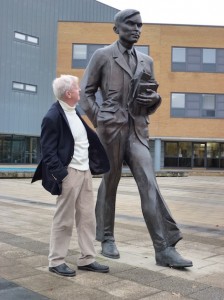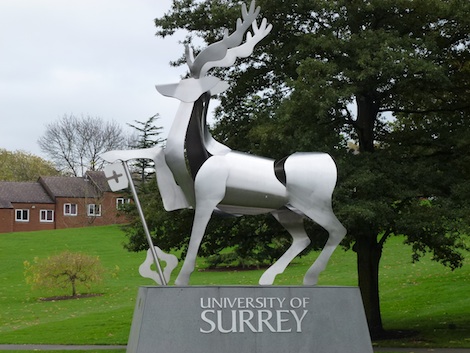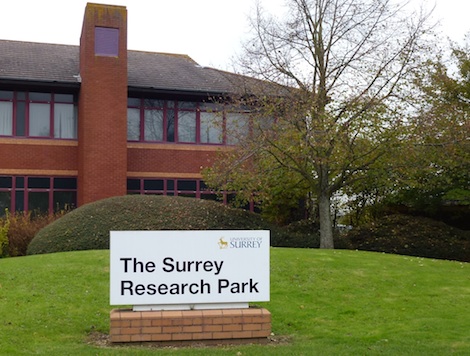- Stay Connected
 Abraham Lincoln
If given the truth, the people can be depended upon to meet any national crisis...
Abraham Lincoln
If given the truth, the people can be depended upon to meet any national crisis...
 Guildford news...
for Guildford people, brought to you by Guildford reporters - Guildford's own news service
Guildford news...
for Guildford people, brought to you by Guildford reporters - Guildford's own news service
Opinion: How Can We Make Guildford A Centre Of World Excellence?
Published on: 11 Nov, 2012
Updated on: 14 Nov, 2012
Former Guildford Mayor and Hon. Alderman Gordon Bridger puts forward his view that the way ahead for Guildford lies not in expansion as a retail centre but as a centre for an expanded world class centre of technology and services.
“Guildford – a centre of world excellence”. This was my theme as Mayor in 2003/4. It led to a series of lectures organised with the help of the University of Surrey, on the many often little known successful enterprises in the Borough. Not only did these include achievements in satellite technology, but in information technology, medical science, vehicle production, psychology and economics.
The extent and importance of these enterprises have subsequently been emphasized and measured in an excellent report by the University “ Guildford Economic Development Study” which the Council commissioned in 2009.
What these figures revealed, which was surprising to many, was that retail development (this definition includes distribution, hotels and restaurants) only contributed around 15% of Gross Value Added (GVA) to the Guildford economy – the town centre 10%.
![]() The most important economic drivers were knowledge, science and financial, business and insurance services for over 31% of GVA. Public administration, education and health accounted for another 22%, and manufacturing 10%.
The most important economic drivers were knowledge, science and financial, business and insurance services for over 31% of GVA. Public administration, education and health accounted for another 22%, and manufacturing 10%.
What is particularly relevant is that most of these enterprises are not in the town centre, and that town centre retail development which has had such a very high profile in recent development proposals only accounted for around 10% of GVA.
This report presents a unique economic portrait of the Borough and its content should be the foundations upon which plans for the future of the Borough are built.
It also makes it quite clear that the greatest hindrance to further development is traffic congestion and the greatest need is for affordable housing. They quote a survey carried out by GBC in 2008 which asks “Factors making The Borough bad for Business”. Overwhelmingly 63% quoted Traffic Congestion and Lack of affordable housing (also 63%).
What emerges from this valuable report is that the really important economic sectors on which we depend is not the retail sector but the provision of high value labour enterprises heavily focused on science and technology of the sort which the University and its research park are providing.
These new start up enterprises, led by young energetic well trained individuals, gather in clusters where they can interact with each other. They need a stimulating environment , skilled staff and housing they can afford. A recent “Economist” magazine report stresses how there has been a move from overcrowded expensive Silicon Valley to other parts of the world including, London by these pioneering entrepreneurs.

Gordon Bridger regards the statue of Alan Turing, who spent some of his younger years in Guildford and was a pioneer of computer technology
Cambridge has recently found funds for a huge increase in its science led development and Guildford which has a nucleus of outstanding young scientists and a highly successful research park needs to build on these achievements
The economic future of the Borough, indeed of Britain, lies in the development of these services rather than the provision of more shops which depend heavily on imported goods and low value labour. This does not mean that improvements to our retail facilities should not be encouraged but that the argument that the Borough’s economy would be severely undermined if we did not massively increase its retail sector is without substance.
Guildford’s economic future lies in promoting these new technologies, and new enterprises. With its splendid location, its trained staff and University, as well as an attractive environment, Guildford is well placed to do this.
Surprisingly the UNIS report fails to mention the need for an appealing environment as a factor important in attracting development. But it is not just a question of a physical environment but also of good social one: good schools, a good University and excellent medical facilities, these are essential for success in a modern society. Fortunately, they exist already but need to be given all practicable support to improve.
Retail development
This has an important part to play in attracting development and the town centre, with one of the best High Streets in southern England (BBC poll) provides what is becoming increasingly important to prosperous and discerning shoppers – a quality shopping environment.
However, this quality imposes restrictions on development of the centre due to the town’s topography. The North Downs and the river severely constrain access and the road pattern is a serious constraint to further expansion in the town centre.
Further expansion of development in the town centre will only exacerbate an already serious traffic problem. It is impossible to visualize any realistic solution to the congestion problem in the foreseeable future. A tunnel is a technical possibility but the costs are unlikely to be affordable, while a bypass would be equally expensive and open to much opposition.

The document used to invite expressions of interest for redevelopment of North Street. The scheme, it is said, could increase retail space in Guildford by 50-100%
Current proposals which envisage as much as 60,000 sq m of more retail space in the town centre (a 50% to 100% increase on existing retail, depending on differing basic data) would create massive traffic problems and could cause very serious financial problems for existing retail enterprises, particularly those in the High Street.
The plans for such a massive retail development were drawn up by retail consultants whose forecasts of increases sales of 3.3% per annum are now quite unrealistic and their principal justification for such an expansion was that all other competing centres in the region have expanded hugely over the last two or three decades, which Guildford has not, and therefore Guildford needs to do the same if it is to retain its competitive edge.
What this recommendation ignores is that Guildford does not have is the ease of physical expansion which other competing centres have. However it does have the advantages of a much more attractive setting which makes it a much better quality shopping centre. The appropriate policy would be to improve the quality of the town centre rather than the quantum of shopping. Massive new shopping malls are neither desirable nor economically necessary.
Guildford should easily be able to hold its own if it concentrates on a qualitative retail environment and does not seek to expand into just another great shopping mall. The ample areas available for development off North Street should compliment the High Street area giving priority to badly needed town centre housing, improved community facilities and secondary retail development, turning it into an attractive semi – pedestrianised environment with easy access to the High Street.
It should be possible to build this into an environment which people would enjoy visiting. (The plans produced by Michel Harper and John Nightingale c.1990 for Bridge Street had some excellent ideas which might be copied).
Planning for the future
 Planning at local Government level is all to do with physical and environmental planning, not economic planning, but if it is to be effective it must be built upon by an effective economic policy.
Planning at local Government level is all to do with physical and environmental planning, not economic planning, but if it is to be effective it must be built upon by an effective economic policy.
Plans need to take into account developments over the whole Borough and to be made by planners with a comprehensive outlook and responsibility. Too much in the past has been left to specialist consultants taking too restricted a view of the Borough with immediate financial gain the main objective.
It is not the purpose of this brief report to prepare a plan for the Borough, which needs assistance from many experts, but in order to emphasize the breadth of expertise required and the issues needing consideration. The following ideas, amongst others, should be given serious consideration in preparing a plan for the Borough.
Major planning issues
- Better access to Heathrow airport by rail
- Expansion of University and research park into Green Belt
- Improving traffic access to A3
- Better access to town centre
- More housing adjoining University and Research Park for specialist staff and University students
- Development of a “village” to attract a cluster of science trained entrepreneurs adjoining the Research Park
- More housing for students and researchers
- Support where necessary for improved educational facilities
- Support for medical research and facilities
- Road and pedestrian bridge over the railway to ease traffic flow on the existing town bridge
- Redevelopment of the railway station, with height limits
- Helicopter facility close to Research Park
Town centre planning issues
- Need to minimize traffic problems – avoiding new massive shopping malls
- Quality housing in the town centre which would fund affordable housing closer to work places outside town centre (this would reduce demand on our roads)
- Existing undeveloped areas of Bellerby and North St. to be planned comprehensively with a high proportion of housing and community facilities , pedestrian areas and links to them
- New retail development should be complimentary to the High Street, not competitive . This would mean making it a “secondary shopping area” with smaller shops (like Godalming). Create a “village “type environment which would attract quality developers – not great shopping mall investors
- Provide underground car parks (contrary to official views these should and could be economic) – Bright Hill an ideal choice
- Offer Debenhams a better town centre site and convert current building to residential
- Introduce a shopper bus, repair setts, improve pavements
- Improve route between the railaway station and the town
- Retain central location for the bus station
Conclusions
The above strategy requires a radical reconsideration of current thinking which is based upon making the town centre a much larger retail focus which would only exacerbate an already over congested traffic system and undermine the financial viability of shops in Guildford’s prime attraction – the High Street.
Developments along North Street should seek to compliment the High Street not compete with it. High quality housing, for which there is a great demand, would facilitate funding of “affordable” housing in other areas.
Fortunately, the economic future of Guildford does not lie in the overcrowded town centre but in its dynamic knowledge and information led services developed around the University and the Research Park.
Adopting the outline of this strategy it should be possible to prepare a plan within a reasonable time limit, at reasonable cost, to provide proposals which would preserve Guildford’s attractive legacy and allow for better economic future.

















Pete Brayne
November 11, 2012 at 1:16 pm
Coincidentally, I shook Mr Bridger’s hand this morning as he was making his way to today’s act of remembrance at Holy Trinity Church. Later my wife and I gathered under Tunsgate with a large crowd of people. An unusual eerie silence was broken by he firing of the maroon, causing many to jump. While this was going on I was struck by another important role for the town centre. It is a place where the community can gather and enact those sometimes strange, yet hugely important, ceremonies that remind us that we are but custodians of the place we call Guildford. The town centre should allow us to connect with a rich history; espousing timeless values that can guide us into an uncertain future.
It seems to me that our notions of success and prosperity have been shaken in recent years. I was struck with the contrast between the high-end products on display as we wandered around Steamer Trading (One small device would neatly pick up and present you with a tooth pick. It cost £86!) and the empty shops and the emergence Poundland, in Guildford!
Last Friday, I shook another Alderman’s hand, that of Tamsy Baker. She had come to the YMCA (where I work) to share her concern for a young woman who is homeless. Again, a contrasting view to the stereotypical notion of what Guildford is like, but something Guildford YMCA has been dealing with for over 140 years.
So, my list of planning issues that we should be considered are;
– the Town is for the people of Guildford
– we need places to gather, where we can be citizens not just consumers
– we need appropriate social housing, especially for young people
– there is no solution to traffic congestion and no accurate way of predicting what will happen other than it’s just going to get worse!
Happy planning!